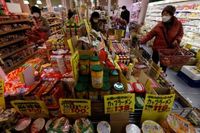Core consumer inflation in Japan’s capital has shown a significant acceleration, remaining above the Bank of Japan’s (BOJ) target and raising expectations of a near-term interest rate hike. Data released on March 28, 2025, revealed that the Tokyo consumer price index (CPI), which excludes volatile fresh food costs, rose by 2.4% in March compared to the same month last year. This increase surpasses the median market forecast of a 2.2% rise and marks an uptick from February's 2.2% gain.
The report highlighted that inflationary pressures are mounting as companies continue to pass on rising raw material costs to consumers. A separate index for Tokyo that strips away both fresh food and fuel costs, which is closely monitored by the BOJ as a measure of domestic demand-driven prices, rose by 2.2% in March from a year earlier, following a 1.9% increase in February.
Food prices have notably risen, with an overall increase of 5.6% in March, compared to a 5.0% rise in February. The cost of rice, in particular, surged dramatically by 92.4%, reflecting the financial strain households are experiencing due to escalating living expenses.
Last year, the BOJ exited a decade-long radical stimulus program and raised short-term interest rates to 0.5% in January, believing that Japan was on the brink of sustainably achieving its 2% inflation target. BOJ Governor Kazuo Ueda has indicated that the central bank will continue to raise borrowing costs if ongoing wage gains support consumption and enable companies to increase prices, thereby maintaining inflation around the 2% target.
The Tokyo CPI data will be critical for the BOJ as it prepares fresh quarterly growth and price forecasts at its upcoming policy meeting scheduled for April 30-May 1, 2025. A Reuters poll of analysts suggests that many expect the BOJ’s next rate hike to occur in the third quarter of this year, likely in July.
In response to the positive inflation data and hawkish signals from the BOJ, the Japanese yen strengthened, climbing to around 150.7 per dollar after rebounding from a four-week low. This rise underscores the market's reaction to the strong inflation figures and the potential for tighter monetary policy.
Investors are also keeping a close watch on the possible impacts of new U.S. tariffs set to take effect next week, which could affect Japan's auto industry and other exports. As the BOJ continues to navigate these economic challenges, the interplay between domestic inflation, currency strength, and international trade dynamics remains crucial.







